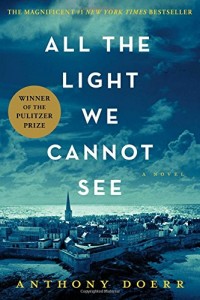All the Light We Cannot See by Anthony Doerr
 Last night, I closed All the Light I Cannot See and asked myself, what the heck happened to this beautiful novel? (OK I didn’t say heck, just trying to keep it clean here at Book Barmy.)
Last night, I closed All the Light I Cannot See and asked myself, what the heck happened to this beautiful novel? (OK I didn’t say heck, just trying to keep it clean here at Book Barmy.)
This WWII blockbuster opens with two riveting story lines. Werner, an orphan German teen is recruited by the Nazi’s for his invaluable radio engineering skills, and Marie-Laure, a blind French girl – separated from her adoring father in war-torn France. Right from the beginning, the reader knows that the lives of these two potentially fascinating characters will intersect.
The novel also has some captivating scenes, all beautifully written. There’s Marie-Laure reading aloud from her braille edition of 20,000 Leagues Under the Sea, there’s the ominous agenda inside Werner’s exclusive Nazi training school, and then, if you’re like me, you’ll hold your breath as messages are passed along, hidden in freshly baked bread, and then secretly broadcast from a short-wave radio hidden in the attic of a crumbling house perched on the edge of the sea. Everything is there — all the elements of a well-written and exciting WWII adventure.
And so you settle in, cup of tea in hand and eagerly start reading…and reading…and reading — through 178 chapters. Yes, you read that right — 178 chapters!
Therein lies the first problem — 178 short chapters, many only a few pages, which jerk the reader back in forth in time, often with no clue to the year. The choppy chapters and abrupt time jumps are not only confusing, they actually prevented me from really sinking into the story. One reviewer, knowing that Mr. Doerr is a much better writer than this, surmised his editors insisted on shuffling the timeline. The format did feel gimmicky and like an afterthought. I’d go even further, I think those same editors also insisted on chopping the novel into short chapters to cater to today’s 140-character-tweet-text-snapchat-attention-span readers (That just wrote itself in the throes of my rant – like it?).
Now we come to the second problem, All the Light We Cannot See starts out beautifully written and compelling, but then it just seems to fall apart — rather it just never comes together. Werner’s and Marie-Laure’s paths, while coming teasingly close, never really converge. And when they do finally intertwine, they are only together for 10 pages towards the end. Then fast forward 30 years and the book ends not with a bang but with a whimper (my apologies to T. S. Eliot).
The novel won Pulitzer Prize, earned many glowing reviews and many weeks on the bestseller lists. Perhaps I missed something magical in my reading of this book. Maybe it was my mood. Whatever the reason, I was underwhelmed and sadly disappointed upon finishing this novel.
A digital review copy was provided by Scribner via NetGalley.





